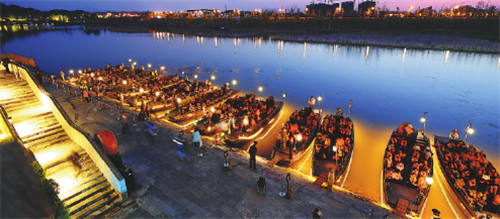Modern renovations recreate idyllic farmland paradise in Changde
 0 Comment(s)
0 Comment(s) Print
Print E-mail China Daily, April 12, 2018
E-mail China Daily, April 12, 2018

Taohuayuan scenic spot in Changde is showing off its bright new look after three years of improvement and upgrade efforts.
Changde is the location of the utopia in The Peach Blossom Spring, a fable written by Tao Yuanming, a famous writer who lived during the Eastern Jin Dynasty (317-420).
Tao portrayed a fascinating world in his story, with a grove of fragranced blossoming peach trees, well-built houses surrounded by fertile farmlands, and the elders and children enjoying themselves.
The inspiration for the story, Taohuayuan in Changde, has been a popular tourist destination for hundreds of years.
Wu Caixia, head of the Taohuayuan tourism management commission, said the scenic spot not only showcases the fable's natural scenes, but also represents the most authentic way of life in ancient times.
To better protect and develop Taohuayuan, the city government spent three years expanding and renovating the scenic spot. The area reopened to the public in September 2017.
The total area of the renovated scenic area has grown from 2 square kilometers to 12 sq km. It consists of more than 70 attractions, such as Qingu Valley, Peach Blossom Mountain and Taohuayuan Ancient Town.
Qingu Valley, which mainly exhibits scenes of life in ancient farming society, is considered a showcase of the mythical paradise in Tao's fable.
The fisherman in the fable accidentally entered the idyllic land of Taohuayuan and experienced first hand the harmony and peace of the village. According to the story, the people living there had never left since their ancestors first arrived with their wives and children to flee from the disorder and chaos of the Qin Dynasty (221-206 BC).
Nowadays, many local residents in Qingu Valley have jobs acting out the lifestyles of people who lived during the Qin dysnasty. They wear period costumes and reenact farmers' daily lives, such as tilling farmlands, planting flowers, and feeding cattle and sheep.
"Taohuayuan is a spiritual home for many people," Wu said.
To restore this spiritual homeland, the management commission has invested heavily in tourism infrastructure facilities. It also created several cultural interactive activities, such as farming and harvesting, to help visitors to get a taste of the simple lives of Chinese people in ancient times.
Wu said the management commission will soon launch an activity called Shared Taohuayuan.
"Everyone has a Taohuayuan in his mind, so we welcome visitors from across the world to claim trees, farmlands, ponds and houses in our Taohuayuan scenic spot," she added.



 Add your comments...
Add your comments...

